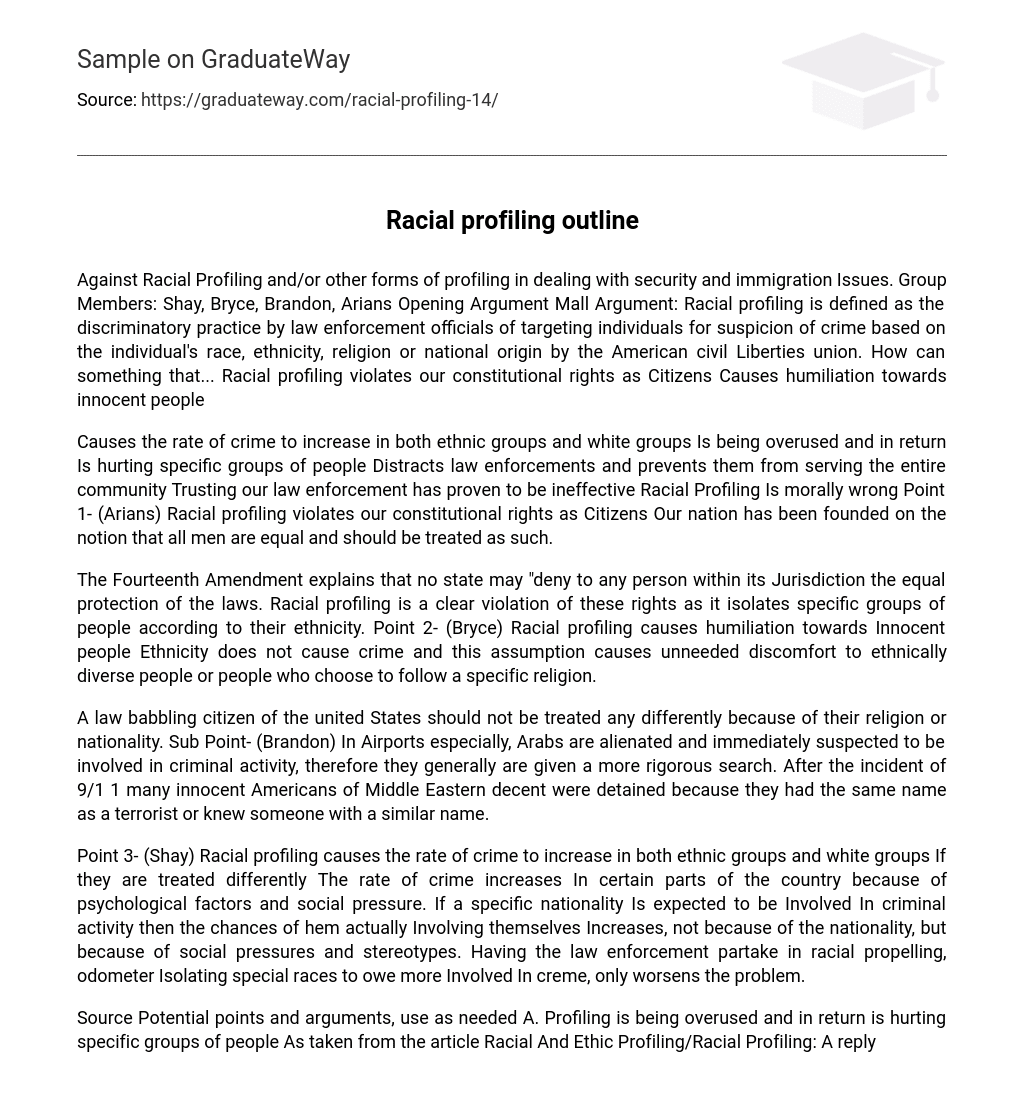Against Racial Profiling and/or other forms of profiling in dealing with security and immigration Issues. Group Members: Shay, Bryce, Brandon, Arians Opening Argument Mall Argument: Racial profiling is defined as the discriminatory practice by law enforcement officials of targeting individuals for suspicion of crime based on the individual’s race, ethnicity, religion or national origin by the American civil Liberties union. How can something that… Racial profiling violates our constitutional rights as Citizens Causes humiliation towards innocent people
Causes the rate of crime to increase in both ethnic groups and white groups Is being overused and in return Is hurting specific groups of people Distracts law enforcements and prevents them from serving the entire community Trusting our law enforcement has proven to be ineffective Racial Profiling Is morally wrong Point 1- (Arians) Racial profiling violates our constitutional rights as Citizens Our nation has been founded on the notion that all men are equal and should be treated as such.
The Fourteenth Amendment explains that no state may “deny to any person within its Jurisdiction the equal protection of the laws. Racial profiling is a clear violation of these rights as it isolates specific groups of people according to their ethnicity. Point 2- (Bryce) Racial profiling causes humiliation towards Innocent people Ethnicity does not cause crime and this assumption causes unneeded discomfort to ethnically diverse people or people who choose to follow a specific religion.
A law babbling citizen of the united States should not be treated any differently because of their religion or nationality. Sub Point- (Brandon) In Airports especially, Arabs are alienated and immediately suspected to be involved in criminal activity, therefore they generally are given a more rigorous search. After the incident of 9/1 1 many innocent Americans of Middle Eastern decent were detained because they had the same name as a terrorist or knew someone with a similar name.
Point 3- (Shay) Racial profiling causes the rate of crime to increase in both ethnic groups and white groups If they are treated differently The rate of crime increases In certain parts of the country because of psychological factors and social pressure. If a specific nationality Is expected to be Involved In criminal activity then the chances of hem actually Involving themselves Increases, not because of the nationality, but because of social pressures and stereotypes. Having the law enforcement partake in racial propelling, odometer Isolating special races to owe more Involved In creme, only worsens the problem.
Source Potential points and arguments, use as needed A. Profiling is being overused and in return is hurting specific groups of people As taken from the article Racial And Ethic Profiling/Racial Profiling: A reply To Two Critics. Matthias Rise, a professor at Harvard University, explains how profiling involves quick judgments being made of who to search. The problem is if many people are involved, not a lot information is provided for an official but what the persons look like.
This leads to profiling only individuals who fit the stereotype of what a criminal would look like, often discriminating people of specific races and giving them an unfair disadvantage. Example? Profiling does have its time and place, namely in criminal cases where it is difficult to narrow down a suspect, but racial profiling referring to “the discriminatory practice by law enforcement officials of targeting individuals for suspicion of crime based on the individual’s race, ethnicity, religion or national origin (American civil Liberties union)”has no place in society as it is unconstitutional.
B. Racial profiling distracts law enforcement and prevents officials from serving the entire community If a race has history of bad experiences with law enforcement they are less likely to report crimes, come forward as witnesses, and otherwise cooperate in police investigations. Racial profiling alienates specific communities which in return reduces the ability for the people to work together with law enforcement agencies, as explained by Tom Head a civil liberties expert.





